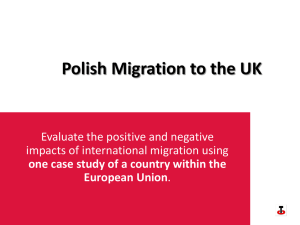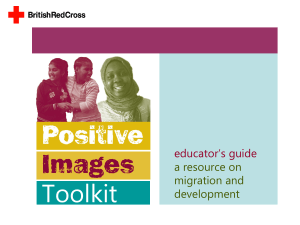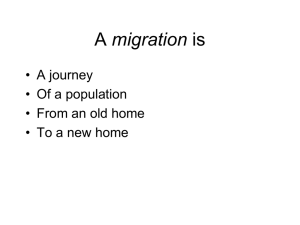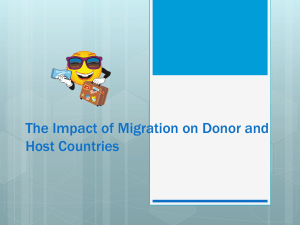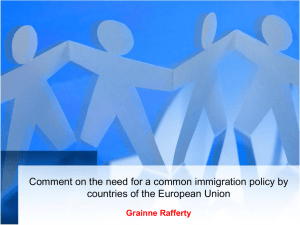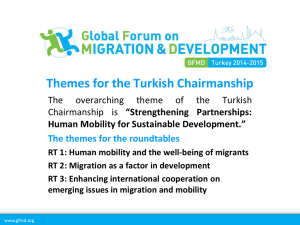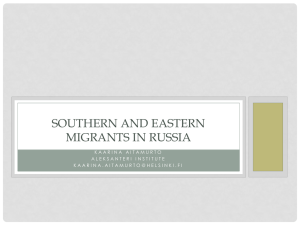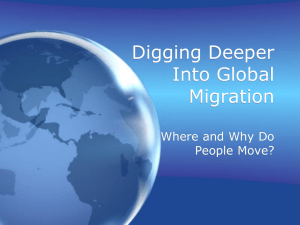V2-6-Migration and Health - International Organization for
advertisement
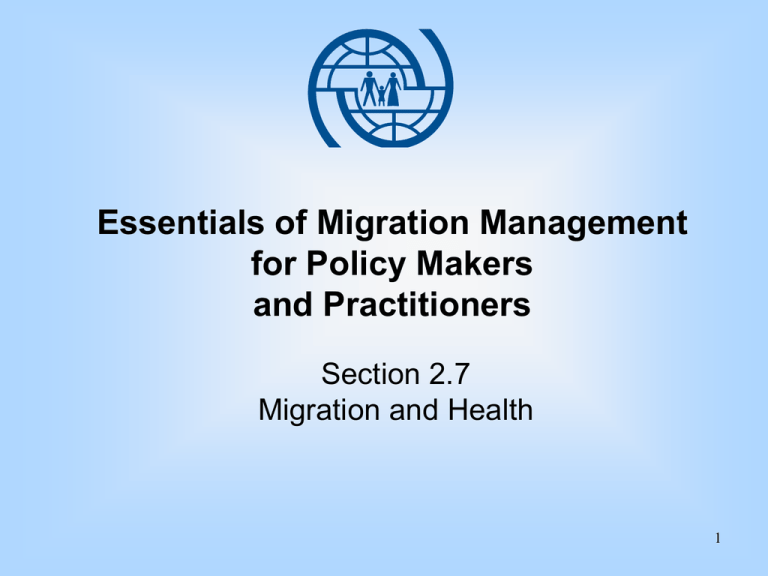
Essentials of Migration Management for Policy Makers and Practitioners Section 2.7 Migration and Health 1 Section 2.7 Migration and Health Learning Objectives • Apply the broad definition of health advanced by the World Health Organization (WHO) to migrant health • Identify links between public health issues and migration policya • Identify the objectives of migrant health and public health policy • Understand links between public health and migration policy • Increase your capacity to assess the adequacy of the health-related elements of migration policy in your setting • Identify special health problems associated with migrants, including those that result from trauma and human rights violations 2 Essentials of Migration Management Section 2.7 Migration and Health Topic Titles Topic One: Health and Mobility Topic Two: Public Health Concerns 1. Protection Against Communicable Diseases 2. Migration Health Assessment 3. Migration and Reproductive Health 4. Migration and Mental Health Topic Three: Particularly Vulnerable Migrants 1. Irregular Migrants 2. Victims of Human Trafficking 3 Essentials of Migration Management Section 2.7 Migration and Health Terms and Concepts Circular migration The movements of migrants who stay in the host country on a short-term basis and return to their country of origin Health Health requires a state of physical, mental, and social well-being, not only the absence of disease or infirmity. In the context of migration, health means the physical, mental, and social well-being of migrants and of mobile populations. Irregular migration Migration that does not follow the laws, policies, and regulations of States is irregular migration. Irregular migration, including human trafficking, can result in migrants hiding in host countries. Public health and individual migrant health risks are increased under conditions of irregular migration. (Continued) 4 Essentials of Migration Management Section 2.7 Migration and Health Terms and Concepts Migration The movement of a person or group of persons across an administrative or political border from one geographical unit to another for temporary or permanent settlement Migration health A specialized field of health sciences, characterized by its focus on the well-being of migrants and communities in countries and regions of origin, transit, destination, and return. It has a dual focus, addressing individual migrants' needs as well as the public health of host communities. Mobility pattern A pattern of migration that repeats itself is recognized as a mobility pattern. Movement from poor countries to rich countries, rural to urban areas, are examples of mobility patterns. (Continued) 5 Essentials of Migration Management Section 2.7 Migration and Health Terms and Concepts Psychosocial An approach to understanding and managing human behaviour and wellness that places equal importance on individual psychological factors and on social factors Public health The process of protecting populations and communities from disease or ill-being and/or establishing policies and programmes that promote healthy living conditions for everyone Trauma A wound to the mind or body that causes physical or psychological injury, impairs well-being, and requires healing. Trauma is closely linked to stress and mental health problems. Repeated or serious trauma can be diagnosed as post traumatic stress syndrome. 6 Essentials of Migration Management Migration and Health Topic One Health and Mobility 7 Topic One Health and Mobility Important Points 1. Effective public health includes all members within communities. 2. A person’s health profile includes his or her personal health history, and his or her cultural, social, economic, and environmental health beliefs. 3. Health care systems of host countries, including public health, may not recognize migrants’ personal health history and beliefs about health. • • Migrants may carry a higher risk of infectious diseases Migrants may experience a “collision of cultures” (Continued) 8 Essentials of Migration Management Topic One Health and Mobility 4. Human rights issues are particularly relevant to migration health policy when trauma, rape, torture, or other inhuman or degrading experiences are part of a migrant’s background. 5. Integration into a host society is an important condition for a successful migration outcome. 6. Addressing migrant health provides benefits to host societies. • Early diagnosis and treatment, and prevention and health education can spare financial, social, and political costs later on. • Healthy migrants are more receptive to education, employment, and social activities/integration. • Healthy migrants contribute more to host societies. (Continued) 9 Essentials of Migration Management Topic One Health and Mobility 7. Regular or irregular mobility patterns and related legal status often define the level of vulnerability of migrants in a society. 8. Some mobility patterns (in particular the irregular ones) have implications that harm migrant health. 9. Mobility involves more than the physical displacement of a person or of populations. 10 Essentials of Migration Management Topic One Health and Mobility Understanding migrant health profiles and beliefs + Access to culturally appropriate health services for migrants = Improved chances for successful integration of migrants in host communities 11 Essentials of Migration Management Migration and Health Topic Two Public Health Concerns 12 Topic Two Public Health Concerns Protection Against Communicable Diseases • More and more people are on the move, patterns of movement are constantly changing, and travel time is faster. • Mobile people interact with and potentially affect and adopt the health profile of all communities along their migration route. • Ignoring the importance of health in the context of mobility and of public health can do more than spread a disease. The cost to societies can go beyond health to affect: trade political relationships financial position in a global economy travel in affected regions. 13 Essentials of Migration Management Topic Two Public Health Concerns Migration Health Assessment • Effective public health measures could prevent the introduction of infectious or communicable diseases associated with mobility of people. • Pre-departure migration health assessment is one way of addressing population mobility and public health concerns • The legislative basis for immigration requirements has a twofold rationale: 1. 2. The protection of public health and safety The reduction of burdens on publicly funded health and social services 14 Essentials of Migration Management Topic Two Public Health Concerns Important Points 1. The legislative base for immigration health assessment is found at three different levels. the World Health Organization’s International Health Regulations, adopted in 1971 and currently under revision national quarantine legislation and regulations governing a country’s activity in managing infectious diseases at the national level specific immigration health laws or regulations designed to manage health and disease concerns in migrant populations (Continued) 15 Essentials of Migration Management Topic Two Public Health Concerns 2. Health assessments are done before arrival by the traditional receiving countries on persons accepted for immigration 3. Health assessments are done after arrival by most European countries. 4. Health assessment focuses on infectious or communicable diseases. 5. When pre-arrival health assessment discloses a condition posing a risk to public health, the response may be quarantine, pre-departure treatment, containment, and exclusion. 6. Pre-departure health assessment by a traditional receiving country focuses on TB, vaccine-preventable diseases, parasitic diseases, and sexually transmitted infections. (Continued) 16 Essentials of Migration Management Topic Two Public Health Concerns 7. The criteria to determine who will be assessed prior to arrival are usually based on: prevalence of a specific infectious disease in the person’s country of origin the category of application the migrant’s intended occupation the migrant’s expected length of stay in the host country. 17 Essentials of Migration Management Topic Two Public Health Concerns What do you think about Migration Health Assessments? 1. Visitors can threaten public health in the context of modern migratory movements and disease transmission. 2. There are a number of potential benefits to the pre-departure or on-arrival health assessment of migrants. 3. Health assessments should be entered into a data system that, while respecting the rights of mobile populations to confidentiality, will share relevant health-related information between health care systems in countries of origin, transit, and destination. 18 Essentials of Migration Management Topic Two Public Health Concerns Migration and Reproductive Health Health policies in relation to reproductive health should be based on: • migrants’ right to reproductive health • migrants’ right to healthy working and living conditions • migrants’ right to reproductive health education • the right to affordable and accessible health care services for all migrant populations, irrespective of their legal status • attention to gender disparities and to gender/power relationships that frequently govern women’s access to information and health care. 19 Essentials of Migration Management Topic Two Public Health Concerns The Health Status of Migrant Women and Children • The reasons for the poorer pregnancy outcome of migrant women are still not well understood. • More recently, causes outside the control of immigrant mothers have been identified: • • • • the stress of migration the rupture of previous social networks religious and cultural factors, including culturally insensitive reproductive health services poor access to health care services and discrimination within the health system (Continued) 20 Essentials of Migration Management Topic Two Public Health Concerns • Migrant mothers from different ethnic groups may have different expectations and perceptions of health and health services than the majority of mothers in the host country. • Lack of knowledge of the language of receiving countries may further add to the difficulties of gaining access to existing health services. • Access to health services may be limited for some groups due to high costs or to lack of entitlement to social services and health care in the receiving society. • Lack of cultural sensitivity or racist attitudes within health services may contribute to poor communication between patients and health care providers, by creating a hostile environment or by disregarding specific needs of the patients. 21 Essentials of Migration Management Topic Two Public Health Concerns What do you think about the Reproductive Health of Migrant Communities? 1. The health of migrant communities, and of mothers and children in particular, needs to be tackled by multidimensional policies that increase protection, economic integration, and participation in social life. 2. It is likely that social policies combined with policies focused at increasing access to health care have a positive effect on the reproductive health of migrant communities. 22 Essentials of Migration Management Topic Two Public Health Concerns Migration and Mental Health 1. Migrants experience losses that affect their mental well-being by contributing to depression, disorientation, and marginalization. These losses can include: • loss of home • separation from family and community • loss of a sense of belonging • loss of a job, career, position in society • loss of identity • loss of support networks • loss of traditions and values. (Continued) 23 Essentials of Migration Management Topic Two Public Health Concerns 2. The risk of mental health problems increases after settlement in host countries as a result of many factors, including: • concerns about legal status • difficulties related to acculturation • racism • housing and health problems • communication problems • isolation 3. Language barriers make communication difficult and lead to a feeling of loneliness and helplessness. (Continued) 24 Essentials of Migration Management Topic Two Public Health Concerns 4. It is not rare to witness migrants who arrive in an apparently good mental state, even after having undergone trauma, become increasingly marginal and fragile after several years in the host country 5. After arriving in a destination country, vulnerability to health problems can continue. 6. In the context of post-conflict or post-emergency situations, attending to the mental well-being of the affected population is an important contribution to future peace and reconstruction. 7. Clinical work with migrants in host countries confirms that problems linked to migration or to the status of migrants survive through several generations. 8. A multidisciplinary approach is required to address migrant mental health problems. (Continued) 25 Essentials of Migration Management Topic Two Public Health Concerns 9. Those who have “chronic mental illnesses”, i.e., those who need specialized psychiatric care because they cannot take care of themselves independently, for example, schizophrenic patients, are extremely vulnerable. 10. Interventions that combine psychological services with social services under the category of mental health can be a useful way to address migrant mental health. 26 Essentials of Migration Management Topic Two Public Health Concerns What do you think about Migration and Mental Health? 1. Migrant health services must be effective across different understandings of mental illness, as well as across different cultures, languages, and locations. 2. Societies that have undergone traumatic events or other events that destabilize the community require that policy developers understand: • • • • • 3. the way in which families and communities influence each other the place given to the dead the rituals that structure society gender balance and roles legal structures and customary law. Policy developers should not reduce the status of traumatized migrants to one of victims. 27 Essentials of Migration Management Migration and Health Topic Three Particularly Vulnerable Migrants 28 Topic Three Particularly Vulnerable Migrants Irregular Migrants 1. Being "undocumented" means that migrants with irregular status such as trafficked persons, smuggled persons, economic migrants and certain subgroups of migrant workers, labour migrants, and asylum-seekers are more exposed to various and significant health risks. 2. Common health conditions found in irregular migrant populations include: • • • • • • • • infectious diseases (tuberculosis, hepatitis) sexually transmitted infections non-infectious conditions (cardiovascular, gastrointestinal, oral/dental) unwanted pregnancy mental and psychosocial illnesses injuries due to violence substance abuse occupational illnesses (Continued) 29 Essentials of Migration Management Topic Three Particularly Vulnerable Migrants 3. The irregular movement of migrants poses individual and public health risks and, as such, has medical consequences. 30 Essentials of Migration Management Topic Three Particularly Vulnerable Migrants What do you think about the health of Irregular Migrants? 1. Acceptance of human rights-based approach requires that, wherever possible, health care and public health measures should provide access to physical and mental health assistance, health education and promotion to irregular migrants. Irregular migrants deserve health care 31 Essentials of Migration Management Topic Three Particularly Vulnerable Migrants Victims of Human Trafficking 1. Persons trafficked for sexual exploitation face significant risks to their mental and reproductive health. 2. Children and adolescents, as compared to adults, are more susceptible to die or suffer serious consequences from the violence associated with rape. 3. From a public health point of view, it makes sense to look at trafficked adolescents and children differently from trafficked adults. 4. The stress faced by trafficked persons and irregular migrants living in an abusive environment significantly affect mental health. 5. Irregular migrants employed in illegal and hidden operations often find themselves in awful working environments. 32 Essentials of Migration Management Last Slide Section 2.7 Migration and Health 33
